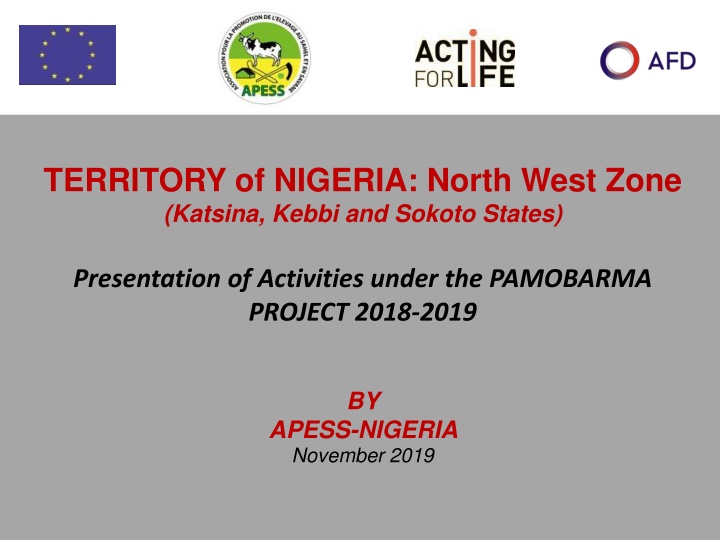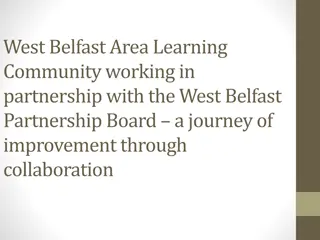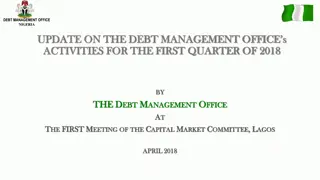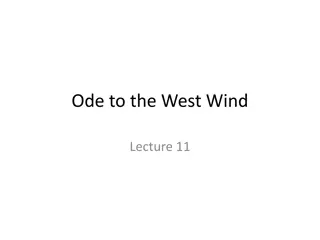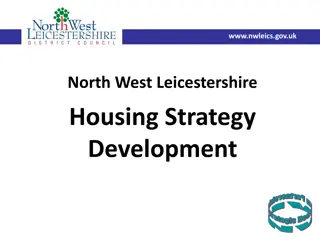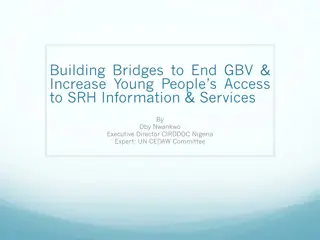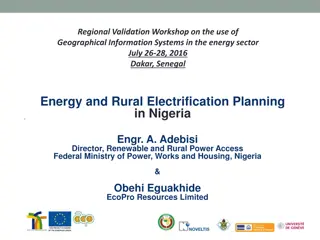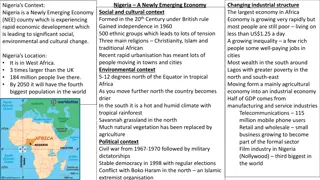Overview of APESS-Nigeria's PAMOBARMA Project Activities in North West Nigeria
APESS-Nigeria, in collaboration with various governmental and non-governmental organizations, has been implementing the PAMOBARMA project in Katsina, Kebbi, and Sokoto states of Nigeria since 2018. The project focuses on promoting livestock farming and enhancing market opportunities for pastoralists and crop farmers in the region through partnerships with local communities, market unions, and NGOs. Multiple markets have been targeted, including Maiadua, Jibiya, Illelah, Tangaza, Amagoro, and Gumki, to facilitate the sale of livestock and agricultural products. The project aims to improve the livelihoods of communities in the North West zone.
Download Presentation

Please find below an Image/Link to download the presentation.
The content on the website is provided AS IS for your information and personal use only. It may not be sold, licensed, or shared on other websites without obtaining consent from the author.If you encounter any issues during the download, it is possible that the publisher has removed the file from their server.
You are allowed to download the files provided on this website for personal or commercial use, subject to the condition that they are used lawfully. All files are the property of their respective owners.
The content on the website is provided AS IS for your information and personal use only. It may not be sold, licensed, or shared on other websites without obtaining consent from the author.
E N D
Presentation Transcript
TERRITORY of NIGERIA: North West Zone (Katsina, Kebbi and Sokoto States) Presentation of Activities under the PAMOBARMA PROJECT 2018-2019 BY APESS-NIGERIA November 2019
Presentation on APESS-PAMOBARMA Project in Nigeria APESS Nigeria - Association pour la Promotion de l Elevage au Sahel et en Savane was established in 1989 in Burkina Faso and started to work in Nigeria under the PAMOBARMA project in 2018 with its project office based in Sokoto. The partnership between APESS Nigeria and Acting For Life (AFL) started with the PAMOBARMA project in August 2018. Within the framework of this project, APESS is working with both Government and Non-governmental organizations. These partners include the following: The Federal Government ( A Line Ministry and Security Agencies). State Governments in Katsina, Kebbi and Sokoto states. Local Governments including Maiadu a and Jibiya in Katsina State; Arewa in Kebbi, Ilelah, Silame and Tangaza in
Presentation on APESS-PAMOBARMA Project in Nigeria Cont. Market Unions and Committees in the following Markets: Maiadu a and Jibiya Markets in Katsina State. IIlelah and Tangaza in Sokoto State. Amagoro and Gumki in Kebbi State. Pastoralists NGOs namely: APESS, MACBAN, KAUTAL HORE Crop Farmers' NGOs: AFAN Communities: Pastoralists and Crop Farmers
Average Number of Livestock in Six Months from the Markets Market Cattle Small Ruminant Presented Sold Presented Sold ILELAH 20,031 15,438 118,236 97899 Mai adua 9,753 6550 27,451 24,345 Jibia 2500 1935 7,610 6,822 Tanagaza 3,986 2,668 40,043 20,193 Gumki 12,510 11,932 9,110 7,230 Amagoro 13,350 12,562 11,063 10,525
Corridor from Sokwara Niger boarder to Amagoro cattle market in Kebbi State
Encroachment along Kaoje-Bagudo- Zagga-Dakin Gari upto Toba Grazing in Kebbi State originating from Benin Republic Nigerien Monument on the Corridor from the boarder to Mai adua cattle market in Katsina State
Water Ponds and Well for Rehabilitation Mopti Pond in Silame LGA Sokoto state Toba Pond in Arewa LGA Kebbi State
Water Ponds and Well for Rehabilitation Cont. A Well targeted for rehabilitation on the corridor from Niger to Mai adua cattle market in Katsina State
Achievements in 2018-2019 High level advocacy and sensitization Diagnosis of markets, corridors and water points Identification of sites where the project will intervene Conduct of Project Inception Workshop with 60 participants from across all Governments, Security Agencies, NGOs and Communities.
Achievements in 2018-2019 Cont. Organized 6 Social Engineering Meetings with Stakeholders within the markets identified for intervention. Met with Security Agencies (Police, Nigerian Army, Nigerian Civil Defense Corps, State Security Service and the Immigration Service). Participation in Conflict Resolution Meetings Convened States to Resolve Pastoralists and Farmers Crisis.
Activities Planned for 2020 Negotiate and Sign Agreements with the 3 Market Associations identified for intervention. Conduct the 2ndTraining of Facilitators on the Livestock Trading Module in West Africa Conduct Informed Debates in the 3 project states Procure a Consultant for Civil Works and launch Tender to Procure Contractors for Civil Works (Markets and Corridors) Award Contracts for Civil Works (Markets and Corridors)
Activities Planned for 2020 Cont. Commence Construction Work at Gumki, Ilelah and Maiadu a Markets. Secure and Demarcate approximately 100km of Corridors in the 3 states: Maiadu a to Niger Boarder (7km) Tangaza Market to Akuya Watering Point (11km) Niger Boarder to Toba Grazing Reserve (60km)
Major Events During the Year Politicization of pastoralism as a mode of production, grazing reserves and ranches. Enactment of Anti-Open Grazing Laws Benue, Taraba and Oyo states Development and Launching of National Livestock Transformation Plan (NLTP) by the Federal Government. NLTP Pilots to commence in Adamawa, Benue, Plateau, Nassarawa, Niger, and Taraba states. Katsina state established an Agency specifically for Livestock Development
Major Events During the Year Cont. Field Missions by APESS BURKINA FASO 3 TIMES, AFL 2 TIMES, and CILSS Courtesy visits on Hon. Minister of Agric. by APESS, AFL and CILSS Reconciliation between pastoralists and farmers in project focused States Rapid response on Security by the Government (Deployment of Security Forces and Dethronement of Traditional Rulers collaborating with Armed Groups Negotiation and Amnesty for Armed Groups Closure of Nigerian Boarders due to Insecurity and Economic sabotage
Challenges The Nigeria s 2019 pre and post election activities delayed the commencement of project activities as perceived in the work plan The unique Nigerian context (Land Tenure system, Encroachment Issues, Debates on Pastoralists Mode of Production) Domestication of Work Plan Perception of partners on the funding pattern of the project Security Challenges
